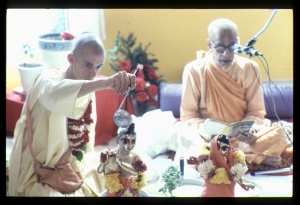SB 4.5.9: Difference between revisions
m (1 revision(s)) |
(Vanibot #0018 edit: make synonym terms in Sanskrit italic in SB - Vanisource) |
||
| Line 1: | Line 1: | ||
{{info | {{info | ||
|speaker=members of King | |speaker=members of King Dakṣa's sacrifice speaking to each other | ||
|listener=members of King | |listener=members of King Dakṣa's sacrifice speaking to each other | ||
}} | }} | ||
[[Category:Srimad-Bhagavatam - Canto 04 Chapter 05|S09]] | |||
[[Category:Bhagavatam Verses Spoken by the Members of Daksa's Sacrifice Speaking to Each Other - Vanisource|040509]] | |||
<div style="float:left">'''[[Srimad-Bhagavatam]] - [[SB 4|Fourth Canto]] - [[SB 4.5: Frustration of the Sacrifice of Daksa|Chapter 5: Frustration of the Sacrifice of Dakṣa]]'''</div> | |||
<div style="float:right">[[File:Go-previous.png|link=SB 4.5.8]] '''[[SB 4.5.8]] - [[SB 4.5.10]]''' [[File:Go-next.png|link=SB 4.5.10]]</div> | |||
{{RandomImage}} | |||
==== TEXT 9 ==== | ==== TEXT 9 ==== | ||
<div | <div class="verse"> | ||
prasūti-miśrāḥ striya udvigna-cittā | :prasūti-miśrāḥ striya udvigna-cittā | ||
ūcur vipāko vṛjinasyaiva tasya | :ūcur vipāko vṛjinasyaiva tasya | ||
yat paśyantīnāṁ duhitṟṇāṁ prajeśaḥ | :yat paśyantīnāṁ duhitṟṇāṁ prajeśaḥ | ||
sutāṁ satīm avadadhyāv anāgām | :sutāṁ satīm avadadhyāv anāgām | ||
</div> | </div> | ||
| Line 16: | Line 22: | ||
==== SYNONYMS ==== | ==== SYNONYMS ==== | ||
<div | <div class="synonyms"> | ||
prasūti- | ''prasūti-miśrāḥ''—headed by Prasūti; ''striyaḥ''—the women; ''udvigna-cittāḥ''—being very anxious; ''ūcuḥ''—said; ''vipākaḥ''—the resultant danger; ''vṛjinasya''—of the sinful activity; ''eva''—indeed; ''tasya''—his (Dakṣa's); ''yat''—because; ''paśyantīnām''—who were looking on; ''duhitṟṇām''—of her sisters; ''prajeśaḥ''—the lord of the created beings (Dakṣa); ''sutām''—his daughter; ''satīm''—Satī; ''avadadhyau''—insulted; ''anāgām''—completely innocent. | ||
</div> | </div> | ||
| Line 23: | Line 29: | ||
==== TRANSLATION ==== | ==== TRANSLATION ==== | ||
<div | <div class="translation"> | ||
Prasūti, the wife of Dakṣa, along with the other women assembled, became very anxious and said: This danger has been created by Dakṣa because of the death of Satī, who, even though completely innocent, quit her body as her sisters looked on. | Prasūti, the wife of Dakṣa, along with the other women assembled, became very anxious and said: This danger has been created by Dakṣa because of the death of Satī, who, even though completely innocent, quit her body as her sisters looked on. | ||
</div> | </div> | ||
| Line 30: | Line 36: | ||
==== PURPORT ==== | ==== PURPORT ==== | ||
<div | <div class="purport"> | ||
Prasūti, being a softhearted woman, could immediately understand that the imminent danger approaching was due to the impious activity of hardhearted Prajāpati Dakṣa. He was so cruel that he would not save her youngest daughter, Satī, from the act of committing suicide in the presence of her sisters. Satī's mother could understand how much Satī had been pained by the insult of her father. Satī had been present along with the other daughters, and Dakṣa had purposely received all of them but her because she happened to be the wife of Lord Śiva. This consideration convinced the wife of Dakṣa of the danger which was now ahead, and thus she knew that Dakṣa must be prepared to die for his heinous act. | Prasūti, being a softhearted woman, could immediately understand that the imminent danger approaching was due to the impious activity of hardhearted Prajāpati Dakṣa. He was so cruel that he would not save her youngest daughter, Satī, from the act of committing suicide in the presence of her sisters. Satī's mother could understand how much Satī had been pained by the insult of her father. Satī had been present along with the other daughters, and Dakṣa had purposely received all of them but her because she happened to be the wife of Lord Śiva. This consideration convinced the wife of Dakṣa of the danger which was now ahead, and thus she knew that Dakṣa must be prepared to die for his heinous act. | ||
</div> | </div> | ||
__NOTOC__ | |||
<div style="float:right; clear:both;">[[File:Go-previous.png|link=SB 4.5.8]] '''[[SB 4.5.8]] - [[SB 4.5.10]]''' [[File:Go-next.png|link=SB 4.5.10]]</div> | |||
__NOTOC__ | |||
__NOEDITSECTION__ | |||
Revision as of 20:54, 30 November 2017

A.C. Bhaktivedanta Swami Prabhupada
TEXT 9
- prasūti-miśrāḥ striya udvigna-cittā
- ūcur vipāko vṛjinasyaiva tasya
- yat paśyantīnāṁ duhitṟṇāṁ prajeśaḥ
- sutāṁ satīm avadadhyāv anāgām
SYNONYMS
prasūti-miśrāḥ—headed by Prasūti; striyaḥ—the women; udvigna-cittāḥ—being very anxious; ūcuḥ—said; vipākaḥ—the resultant danger; vṛjinasya—of the sinful activity; eva—indeed; tasya—his (Dakṣa's); yat—because; paśyantīnām—who were looking on; duhitṟṇām—of her sisters; prajeśaḥ—the lord of the created beings (Dakṣa); sutām—his daughter; satīm—Satī; avadadhyau—insulted; anāgām—completely innocent.
TRANSLATION
Prasūti, the wife of Dakṣa, along with the other women assembled, became very anxious and said: This danger has been created by Dakṣa because of the death of Satī, who, even though completely innocent, quit her body as her sisters looked on.
PURPORT
Prasūti, being a softhearted woman, could immediately understand that the imminent danger approaching was due to the impious activity of hardhearted Prajāpati Dakṣa. He was so cruel that he would not save her youngest daughter, Satī, from the act of committing suicide in the presence of her sisters. Satī's mother could understand how much Satī had been pained by the insult of her father. Satī had been present along with the other daughters, and Dakṣa had purposely received all of them but her because she happened to be the wife of Lord Śiva. This consideration convinced the wife of Dakṣa of the danger which was now ahead, and thus she knew that Dakṣa must be prepared to die for his heinous act.